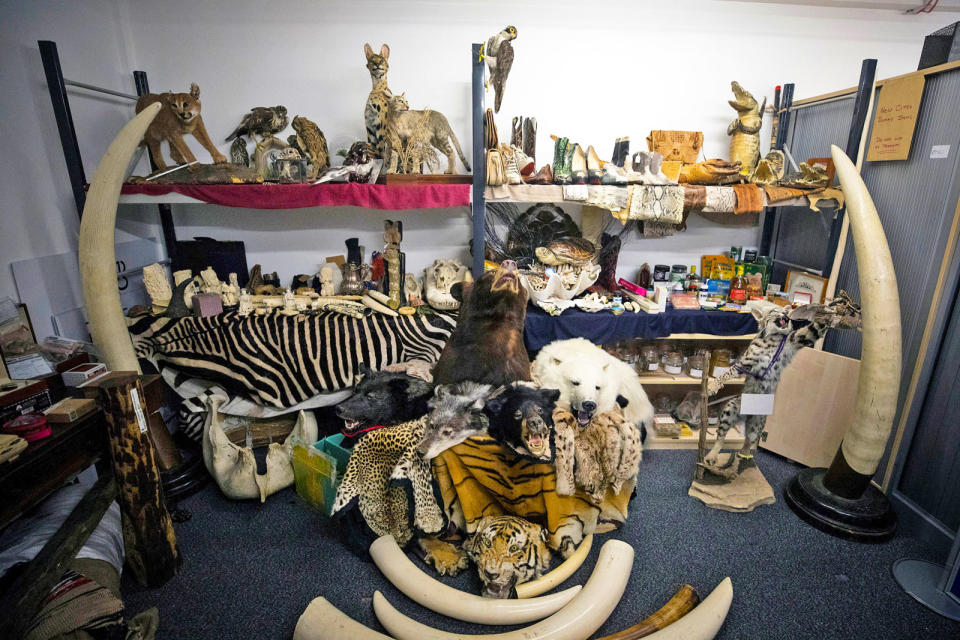Tech giants like Google and Alibaba are working to save endangered species
Black markets have been using popular social apps and platforms to ply their illicit trade.
Google, eBay and other technology leaders are aiming to protect the world's animals. Why? In a widely unregulated social-media world, many tech platforms have become a haven for the wildlife black market, a $20 billion industry.
The sale of illegal animal goods -- from ivory to exotic pets -- is the fourth-largest criminal global trade industry behind narcotics, counterfeiting and human trafficking, according to TRAFFIC, a wildlife-trade-monitoring network. In the past decade, the sale of these goods and species has moved from illicit backroom dealings in stores to apps and online shopping ads.
Now, 21 tech giants from North America, Europe, Asia and Africa are taking a stand as the first businesses to join the Global Coalition to End Wildlife Trafficking Online, which has issued a pledge to reduce this illegal trade online by 80 percent by 2020.
The coalition is spearheaded by the World Wildlife Fund (WWF), TRAFFIC and the International Fund for Animal Welfare. They'll collaborate directly with these tech companies in drawing up action plans to take on trafficking threats and offering staff trainings to pinpoint illegal sales.
Giavanna Grein, program officer for wildlife crime for TRAFFIC at WWF, said this will happen in two phases. First, companies will share what they have learned about addressing specific trade threats so they can learn from one another. Then, each company will develop a plan for its sites or apps.
"Law enforcement alone cannot police the open web globally due to the sheer scale of online trade and their limited resources," Crawford Allan, senior director for wildlife crime at TRAFFIC at WWF, told Engadget. "We realized if the companies can remove ads before they are posted or can look out for organized criminals that they can report to law enforcement, this will really help tackle the problem rapidly."
Allan said this coalition is the first of its kind, especially among companies that would traditionally be seen as competitors. Beyond Google and Alibaba, organizations that have joined the coalition are Baidu, Baixing, eBay, Etsy, Facebook, Huaxia Collection, Instagram, Kuaishou, Mall for Africa, Microsoft, Pinterest, Qyer, Ruby Lane, Shengshi Collection, Tencent, Wen Wan Tian Xia, Zhongyikupai, Zhuanzhuan and 58 Group.
When they asked these companies to be part of the coalition, WWF, TRAFFIC and IFAW laid out the issues around wildlife trade and the role of these sites in facilitating illegal trade and explained how the companies can combat this activity by setting up closed-door workshops among the businesses. You might assume it would be a challenge to corral all these competitors, but Allan said they were all willing to confront the issue as an industry.

From the tech perspective, this coalition builds on efforts to fight illegal trafficking online. Mike Carson, eBay's senior manager of global policy and regulatory management, told Engadget the retail site established a global ivory ban back in 2008. It has been working to flag and scrub listings from criminal traders, and said 45,000 illegal wildlife listings were blocked or removed last year alone.
Carson said eBay had been working with WWF, TRAFFIC and IFAW to train employees. He said he is looking forward to working with industry peers to combat the trade, but said there's always room for improvement: eBay will build on these policies through the coalition and "define a set of areas" where wildlife trafficking seems to be most prevalent on the site.
A big part of the coalition's work will be to educate consumers about the importance of avoiding goods like ivory that were most likely the result of illegal poaching, Carson said.

"There should be a negative stigma attached to the purchase and sale of illegal wildlife products, just as there is for other illegal items like drugs or weapons," he added.
Consumer awareness is key, said Susan Lieberman, vice president of international policy at the Wildlife Conservation Society, which isn't part of the coalition.
"You aren't going to a shopping mall -- you are buying from the comfort of home, rather anonymously. When people are home on their computers there needs to be more awareness raised among the average customer," she said. "The customer needs to know that it is illegal. When companies start these awareness campaigns, it's not about nice brochures but making sure people can't even find these items to begin with. You have to make it harder for [traders]."
She said shoppers who have doubts about an item's provenance should just not buy it -- something like a rhino horn should be a no-brainer.
Lieberman has spent 30 years monitoring wildlife trade, and said that in the past governments could target brick-and-mortar shops selling illegal goods, but internet has led to something of a free-for-all.
She said she doesn't think tech companies have done enough in the past to put an end to this, but this coalition is a step in the right direction.
"Social media has just made it easy -- too easy -- for this kind of illegal activity. Good things are easier, too, but we just need to make sure it is extremely hard for people to buy and sell endangered species," Lieberman added.
Allan believes once companies start stepping up enforcement on their platforms, criminals will move more of their operations to the "dark web," which will hopefully shrink their audience and stem sales.
It might be impossible to make this criminal activity go extinct, but the coalition is a step in the right direction of saving some of the Earth's most precious species.
Barcroft Media via Getty Images (Rhino);













